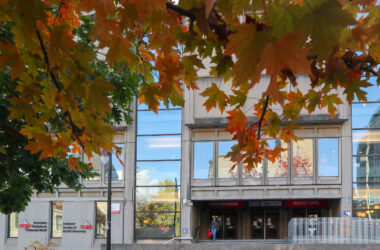The residents of Royal Victoria College, Upper Residence, and Douglas Hall received an unwelcome holiday gift in January, when they found that McGill Food and Dining Services had hiked their prices.
Students of Upper Residence, frustrated by what appeared to them a “lack of respect” on the part of MFDS, created “PRICED,” a workgroup designed to find solutions to the complaints of students locked into meal plans with MFDS. PRICED, led by Molson resident and First Year Council President Valentine Sergeev, stands for “Perturbed Residents Interested in Changing Expensive Dining.” Despite what its tongue-in-cheek name might suggest, Sergeev said that PRICED is less interested in changing, and more interested in understanding MFDS’s pricing decisions.
In response to the price hike, Sergeev and other PRICED members drafted a petition which demanded accountability in MFDS’s decision-making and more student input in its policies. Within 24 hours, nearly 500 residents of Molson, McConnell, and Gardner had signed it.
Despite the claims of an article in the McGill Daily, PRICED has never set out to lower food prices.
“It’s not the fact that the prices were raised,” Sergeev said. “It’s how [MFDS] went about it.”
Instead, PRICED’s petition says the group seeks to be a channel of communication through which residents can express their discontent with “the decision of MFDS to increase food prices mid-year without prior notice or explanation to students” and “the general refusal of MFDS to communicate with the student body and its representatives regarding the food services it provides.”
PRICED was particularly annoyed when MFDS failed to acknowledge or explain its price-hike policy until the third week of January. Sergeev suggested that had some residents not noticed a higher than usual number on the cafeteria’s cash register while checking out, many would likely never have known about MFDS’s newest policy.
Sergeev stressed the importance of mutual respect between MFDS and residents who, he claimed, were “genuinely upset” with MFDS’s “lack of openness towards the students.”
In the near future, Sergeev said, PRICED hopes to see “more financial information published on the [MFDS] website,” in order to understand MFDS’ costs for certain food items, like a $3.50 energy drink or a $6.50 hot meal.
PRICED has met with the executives of MFDS twice since the petition surfaced last week. Sergeev recognized the efforts made by MFDS to address students’ concerns and claims the meetings have been constructive.
Mathieu Laperle, the director of Food and Hospitality Services, acknowledged that MFDS had failed to notify residents of the price increase. Oliver de Volpi, executive chef, agreed with Laperle.
“We regret the way we implemented the food hike,” de Vopli said. “But we do not regret the food hike.”
In the face of rising raw food prices over the past year and a half, de Volpi claimed that MFDS — which had previously refrained from increasing food prices — was merely “bringing [its] costs in line with what they should be.”
“The goal [of MFDS] is not to make profit, but to generate enough money to pay our expenses,” said Laperle. At the same time, Laperle added that MFDS wanted to “upgrade [its] locations and services on campus and in dining halls.”
Improvement is, of course, expensive. As a self-financed department with no financial ties to McGill University, MFDS is burdened with a mortgage from its 2009 renovation of Royal Victoria College’s cafeteria.
Regardless, Laperle, de Volpi, and Monique Lauzon, MFDS’s marketing and quality counsellor, stressed that MFDS has, and will continue to, prioritize the concerns of the student body.
“We are very responsive to students’ feedback and we do not take their comments lightly,” Lauzon said. “Students have a voice through various channels of communication that are already in place.”
According to Laperle, MFDS receives and responds to approximately 100 emails from students each month. In the same time frame, MFDS receives around 100 visits in its main office in Royal Victoria College from residents with questions, concerns, and constructive comments about the meal plan.
Further, in April 2009, MFDS created the Food and Dining Advisory Committee, or FADAC, as a forum for residents, student government officials, and executive members of the MFDS to discuss students’ concerns with food and dining on campus.
In response to PRICED’s request for a detailed breakdown of the cost of food items offered in residence, de Volpi said that he “would have no problem with that.”
Both MFDS and PRICED have the same goals in mind: mutual respect and increased communication. After all, noted Sergeev, “We need to work with MFDS to make things better for us. Only with open-mindedness and communication can we make progress.”
The executives of MFDS agreed. “We want students to know we are listening,” Laperle said. “Are we perfect? No. Could we improve? Of course.”








